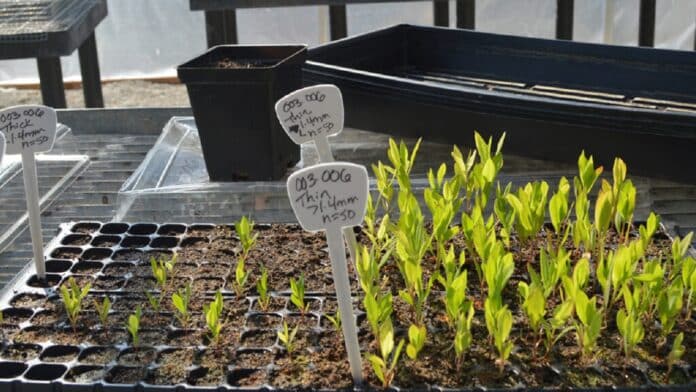Crop progenitors show remarkable variability in critical features affected by domestication, such as plant architecture, yield, emergence timing, flowering, fruit set, and seed and fruit shape.
The story of how ancient wolves came to secure a spot near the campfire is well-known, but did humans also favor specific wild plants for domestication because they were easier to “tame”? A wild animal must be tamable and capable of living close to people without displaying hazardous hostility or destroying fear to be tamed.
Taming was a critical initial step in the domestication of animals, and it is well-known that some species are easier to tame than others.
Based on over ten years of observations and experiments, Washington University in St. Louis research argues for a reevaluation of the process of plant domestication. The behavior of erect knotweed, a relative of buckwheat, has caused paleoethnobotanists to reevaluate how we currently perceive plant domestication.
Natalie Mueller, an assistant professor of archaeology at Washington University, has discovered that some wild plants are more easily tamed than others because they respond fast to clearing, fertilizing, weeding, or thinning.
She said, “We have no equivalent term for tameness in plants, But plants are capable of responding to people. They have a developmental capacity to be tamed.”
Plasticity means the ability of a species to manifest multiple traits and characteristics in reaction to its environment, and not all species are equally plastic.
She said, “If plants responded rapidly in ways that were beneficial to early cultivators, for example, by producing higher yields, larger seeds, seeds that were easier to sprout, or a second crop in a single growing season, this would have encouraged humans to continue investing in the co-evolutionary relationship.”
The researcher said, “Some plants respond quickly and obviously to cultivation and care. I think ancient people would have noticed that they could double their yields just by thinning out dense stands of plants. This is one of the simplest and most common gardening techniques. However, it has many important effects on the development of plants.”
A new study focuses on work with erect knotweed, a buckwheat family member domesticated by indigenous farmers in eastern North America.
The domesticated sub-species is now extinct, but Mueller and colleagues have previously discovered caches of seeds kept in caves, charred plant fragments in ancient hearths, and even erect knotweed seeds in human feces, indicating that this species was once a staple meal.
Mueller researches crop loss and has spent years cultivating erect knotweed and other crop progenitors in experimental gardens, notably at Washington University’s Tyson Research Center. She has only sometimes had success growing the plants she finds in the wild.
In this way, Mueller relates to early farmers experimenting with plants to uncover their potential. Due to the seed dormancy typical of wild plants, her efforts have frequently been thwarted.
Unlike garden store seeds, most wild plants will not germinate if you drop some water on them. Their germination requirements are diverse and affected by their evolutionary history. For example, suppose a plant evolved in a cold climate, such as the Midwest. In that case, its seeds may germinate once exposed to prolonged low temperatures. In the wild, this prevents them from growing too soon. They are waiting for spring. Domesticated plants have lost their ability to meet various germination needs.
Domestication theorists have been perplexed by the lack of germination inhibitors. Planting seeds provides several selective forces that could have favored the emergence of this characteristic. But why would ancient people have planted seeds if none of them grew?
According to Mueller’s research, cultivating wild plants in low-density environments like those found in cultivated gardens causes plants to generate seeds that germinate more readily, removing a significant barrier to further selection.
Mueller said, “Our results show that erect knotweed grown in low-density agroecosystems spontaneously ‘act domesticated’ in a single growing season before any selection has occurred.”
Mueller believes that in domestication research, there is a bias toward interpreting changeability, or plasticity, as noise that obstructs attempts to understand evolutionary change.
According to Natalie Mueller’s paper, they need to understand the growth and behavior of wild crop relatives to explain domestication’s evolution.
She said, “Because we lack the practical experience with crop progenitors that ancient people had, these effects of the environment on plant development have gone mostly unnoticed and understudied.”
Her results might be used to generate new food crops. We should not be limited to plants that our forefathers domesticated thousands of years ago, and some scholars have advocated for de novo domestication.
According to Mueller, it may make sense to begin exploring wild plants that are easily tamed as possible crops that could be cultivated in the future.
This study also contributes to the growing understanding that plants are responsive and communicative beings and that domestication is the outcome of reciprocal connections between various species, all capable of responding to one another.
A recent study has shown how plants use chemical signaling to warn relatives about herbivores, share resources via mycorrhizal networks, and even produce noises when hurt or disturbed.
Mueller said, “You can’t explain plant domestication if you only consider the behaviors of humans because domestication is the result of reciprocal relationships between multiple species that are all capable of responding to each other.”
Journal Reference:
- Mueller, N. G., Horton, et al. The taming of the weed: Developmental plasticity facilitated plant domestication. PLOS ONE. DOI: 10.1371/journal.pone.0284136
